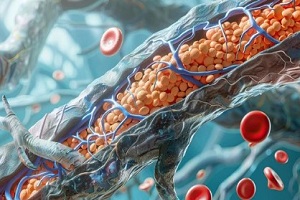 You may have seen some strange letters, such as LDL and HDL, on your cholesterol screening results and wondered what they mean. These letters refer to different types of cholesterol and lipoproteins in your blood.
You may have seen some strange letters, such as LDL and HDL, on your cholesterol screening results and wondered what they mean. These letters refer to different types of cholesterol and lipoproteins in your blood.
Getting familiar with the alphabet soup of cholesterol numbers empowers you to understand your heart disease risks and make informed decisions about lifestyle changes and potential medications.
Cholesterol: Understanding the Basics
Cholesterol is a waxy material resembling fat that attaches to proteins and travels through your bloodstream. The combo packet of cholesterol plus its protein escort is called a lipoprotein.
You need some cholesterol to keep your body functioning properly, but too much can build up inside your artery walls. This cholesterol plaque narrows your blood vessels over time and increases your odds of experiencing dangerous clots, heart attacks, or strokes.
Knowing your complete cholesterol screening numbers, including total cholesterol, LDL, HDL, and triglycerides, helps determine your level of heart disease risk so you can proactively lower it.
A Quick Look at LDL Cholesterol
LDL cholesterol is infamously known as the “bad” kind because it contributes most to plaque formation inside arteries when elevated. Think of the L as standing for Lousy cholesterol that you want to keep Low.
LDL attaches strongly to artery walls, gets oxidized, and recruits even more cholesterol to pile into plaques over months and years.
That’s why keeping LDL levels below 100 mg/dL through medication, diet, exercise, and not smoking reduces the odds of you developing the slowly ticking time bomb of cardiovascular disease in the future.
Exploring HDL Cholesterol
In contrast to LDL, HDL cholesterol is desirable. Think of the H as standing for Healthy cholesterol that you want to raise High. This “good cholesterol” acts as a liver recycler and heart helper.
Here’s how HDL helps. As LDL and other lipoproteins deposit cholesterol into artery walls, HDL swoops in and carries a portion of that cholesterol back to the liver for disposal before plaques develop.
The higher your HDL number, the more cholesterol it can remove from arteries and transport out of the body before causing harm. Doctors consider HDL levels of 60 mg/dL or higher ideal for heart health.
Raising HDL takes commitment to regular cardio exercise, maintaining a healthy body weight, quitting smoking, and potentially moderating alcohol intake. Medications such as statins may also effectively elevate sagging HDL counts for some people.
The Role of Triglycerides
 While LDL and HDL carry cholesterol through your bloodstream, another type of lipid called triglyceride also circulates in your blood.
While LDL and HDL carry cholesterol through your bloodstream, another type of lipid called triglyceride also circulates in your blood.
After you eat, your body immediately converts unneeded calories into triglyceride form. These triglycerides then enter the blood either solo or after combining into certain lipoproteins.
Healthy fasting triglyceride levels should remain under 150 mg/dL. When elevated, triglycerides correlate closely with LDL increases and HDL decreases, substantially raising CVD risk as all three metrics move collectively in the wrong direction.
Lifestyle Adjustments to Improve Cholesterol Numbers
Knowing your complete cholesterol screening results allows you and your doctor to pinpoint where risks are highest and which numbers need the most improvement through lifestyle changes. This helps lower the odds that you will require medication down the road.
Changes that boost heart health across the board include:
Replacing Unhealthy Fats
Swap out saturated fats and trans fats in your diet with anti-inflammatory unsaturated fats such as olive oil, avocados, nuts, seeds, and fatty fish. Saturated fats raise LDL levels, while trans fats lower HDL. Choosing better fats fights inflammation while keeping LDL cholesterol from oxidizing into artery-damaging particles.
Eating More Plants
 Load up on fiber-rich fruits, vegetables, beans, lentils, and whole grains such as oats and brown rice. Soluble fiber directly lowers LDL cholesterol absorption from food.
Load up on fiber-rich fruits, vegetables, beans, lentils, and whole grains such as oats and brown rice. Soluble fiber directly lowers LDL cholesterol absorption from food.
Produce provides antioxidants and phytochemicals missing from highly processed goods, offering defenses against cell damage contributing to plaque formation.
Exercising More
Aim for at least 30 minutes of moderate-intensity physical activity daily or 150 minutes per week minimum. Aerobic exercise reduces triglycerides, raises HDL, lowers LDL, keeps weight in check, and supports healthy blood pressure levels — cumulatively making significant dents in cardiovascular risk. Consistency matters most, so make movement fun.
Reaching Healthy Weight
If overweight or obese, gradually reducing body weight safely by 7% to 10% of your total mass may meaningfully improve all lipids.
For example, a 200-pound person losing 15 to 20 pounds can expect notable upticks in HDL, decreases in LDL, lower triglycerides, and better cholesterol ratios. Losing as little as 5% body weight still makes a worthwhile difference.
Minimizing Alcohol Intake
Avoid heavy, regular alcohol consumption, which drives up triglycerides and blood pressure. While mild intake may raise HDL slightly, benefits diminish above one drink daily for women and two for men. Given carb and calorie content, wine, beer, and mixed cocktails contribute to weight gain as well.
Quitting Smoking
Quitting smoking is imperative for cardiovascular health, both short and long-term. Smoking cigarettes spikes blood pressure and heart rate immediately while suppressing HDL.
 Eventually, an exponential increase in LDL oxidation and inflammation damages delicate arteries. Kicking the habit is challenging but pays continuous dividends.
Eventually, an exponential increase in LDL oxidation and inflammation damages delicate arteries. Kicking the habit is challenging but pays continuous dividends.
Follow these habits consistently, verify improvements in follow-up cholesterol screenings, and keep heart disease odds low for life. Small daily changes build over time for big rewards.
Imperial Center Family Medicine: Complete Lipid Testing and Counseling
Imperial Center Family Medicine in Durham, NC offers comprehensive cholesterol screening plus expert analysis of what your cholesterol subtype numbers mean and how to improve them. No confusing medical jargon — just the facts and guidance you need to protect your heart now and decades down the road.
Regardless of individual risk factors such as family history or preexisting conditions, our expert staff considers managing cholesterol vital for patients of all ages and backgrounds.
Book an appointment to have your complete cholesterol screening numbers explained and create an action plan catered to your needs and health goals. Contact us today at 919-873-4437 or online, and your heart will thank you.
